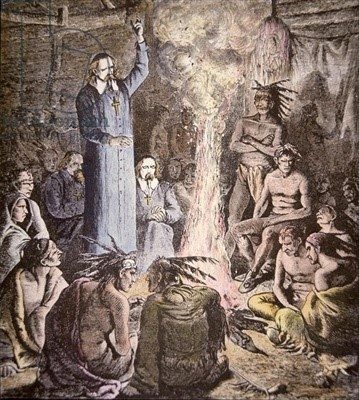All North American Catholics can claim spiritual sonship of the martyrs Isaac Jogues (1607-1646), Jean de Brébeuf (1593-1649) and companions.
The Hurons named Brébeuf “Echon” meaning either “healing tree” or “he who bears the heavy load”, either because he had brought them medicines or because the strongly-built priest had usually carried more than his share of the load on journeys, or perhaps for both reasons.
On March 16, 1649 the Iroquois captured Jean de Brébeuf and Gabriel Lalemant near Georgian Bay. The account of their deaths is not for the faint-hearted. The capturers fastened them to stakes, scalped and mutilated them, poured boiling water over their bodies and applied fire and necklaces of red-hot hatchets to their skin. Not a single cry escaped the lips of Brébeuf.
The Iroquois, in awe at such superhuman courage, later cut out his heart and ate it, hoping to receive some of his spirit. Francis Parkman, writing of the last hours of Brébeuf, stated:
“He came of a noble race, – the same, it is said, from which sprang the English Earls of Arundel; but never had the mailed barons of his line confronted a fate so appalling, with so prodigious a constancy. To the last he refused to flinch and ‘his death was the astonishment of his murderers.’”[1].
It was the heroic end of a fifteen year saga filled with the stuff of daily heroism, as he, in a matter-of-fact manner and with a touch of humor, wrote in a letter of 1636 to the ardent young Jesuits in France who were hoping to join him:
„When you reach the Hurons…you will arrive at a time of the year when fleas will keep you awake almost all night. And this petty martyrdom, to say nothing of mosquitoes, sand flies, and suchlike gentry, lasts usually not less than three or four months of the summer.”
[1] FRANCIS PARKMAN, The Jesuits in North America in the Seventeenth Century, [1867], Boston, 1910, II, p.213-14.

